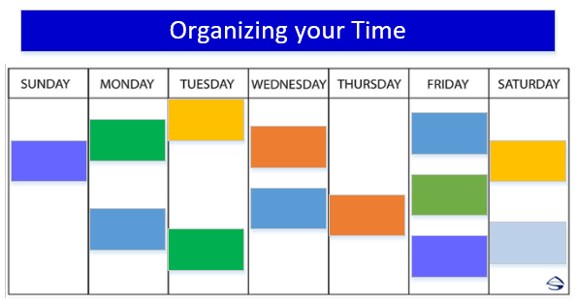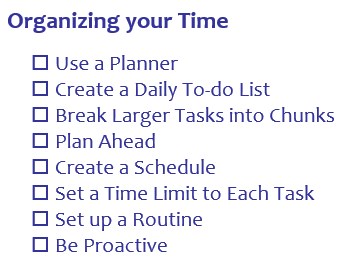Tips for Organizing your Time
Having good organizational skills are essential to be successful for all aspects of life. If you are well organized, you will be able to perform tasks and activities more effectively and efficiently. Thus, your overall performance will be enhanced.
Some people are naturally organized, however, many struggle with organization. The good news for people who struggle is that there are many techniques that are very effective in improving organizational skills.
Below are tips for organizing your time and improving your personal organizations skills.
- Use a Planner
- Create a Daily To-do List
- Break Larger Tasks into Chunks
- Plan Ahead
- Create a Schedule
- Set a Time Limit to Each Task
- Set up a Routine
- Be Proactive
Organizing your Time
Use a Planner
Start your time management system by getting an annual planner. An annual planner can be extremely helpful in getting yourself organized. You can use it to mark set items such as appointments, meetings, and events.
In order for a planner to be effective, you have to refer to it daily and write down activities that will happen in the long term. It is important to spend a few minutes in the morning or the night before to review your plans. This will help you visually see and understand what you intend to accomplish in any given time frame.
You can get a booklet planner or electronic one. The nice thing about the electronic one is that you can sync your calendar to your mobile phone so you can access your schedule no matter where you are. Electronic planners also provide reminders for upcoming appointments.

Create a Daily To-do List
A planner is a great tool to track your appointments and events, but you also must track your activities and tasks. Therefore, it is beneficial to create a to-do list by writing down everything you need to do that day. By writing down these daily tasks, you do not have to worry about trying to remember everything that needs to be done. This allows you to focus on the task at hand instead of wondering what else you need to do that day.
A daily to-do list can be instrumental in helping you get your tasks in order. It is a great visual showing you the expectations you need to accomplish for that day. After you complete a task cross that item off the list. Crossing things off items will make you feel productive, and a fully crossed off list gives a great sense of satisfaction.
Break Larger Tasks into Chunks
Another great way to organize your time is to break them into chunks. If you have larger tasks to complete such as a project or report, break them down into smaller segments. This will make it seem less overwhelming and allow you to slowly progress to the finish product.
For example, if you have a paper or report due at the end of the month, break it down into segments so you accomplish a portion at a time. This way you are not pressed to get it all done in the last week.
Example of a report and due dates;
- Brainstorm ideas (March 5)
- Create outline (March 10)
- Create draft (March 17)
- Revise draft (March 24)
- Final review and edit (March 31)
Plan Ahead
A great way to stay organized and productive is to plan ahead. Know what you need to do for the next day and make preparations to get it done. Drafting a to-do list at the end of the day for the following day will save you time the next morning. This way, you will not have to try to think of all the tasks you want to accomplish that day. If you think of something else overnight, simply add it to the list.
Create a Schedule
Most people do not have a set plan for the day, which means they are reacting to situations, rather than preparing for them in advance. It is great to have a to-do list, but if you do not have a schedule, you may not be making the best use of your time. Creating a schedule, will allow you to organize your day and break it up into manageable chunks.
When making a schedule for the day, start with your scheduled appointments from your planner, than add in tasks and activities you need to accomplish for that day. Place the high priority items at the top of the list so that you have time to get them done.

Set a Time Limit to Each Task
When creating your schedule, include how long you think each task will take. This way you have a set time limit for each task. This prevents your work from dragging on and taking time that was reserved for other activities. For example, reading and responding to emails can consume your whole day if you let it. Instead, set a time limit for this task so that you can accomplish others tasks during the day.
If one of the tasks is taking a lot longer than you had anticipated, you can then foresee the impact this will have on the rest of your schedule. This way you can finish the task and move other items to a different time slot, or you can cut the task short and reschedule.
Set up a Routine
One of the best ways to organize your time is to set up a routine. Create a routine that effectively manages the best use of your time. If you have more energy in the morning, set that time to complete tasks that require more energy. Use the afternoon time to complete activities that require less energy.
A benefit of setting a routine is that it becomes habit, and you will not have to spend time thinking about what to do next, you automatically jump into the next task.
Be Proactive
The longer you wait to do something, the more difficult it will be to get it done. You are more likely to get more things done if you start early. By starting early, you can avoid stress by having plenty of time to get all your necessary tasks done.
If you want your life to be less stressful, then plan your tasks and activities as soon as you can. Putting in the effort to get things done as soon as possible will lift the pressure off you from doing it later.
Also, if you begin work early you will have some time if another more urgent task pops up which needs to be dealt with first.

